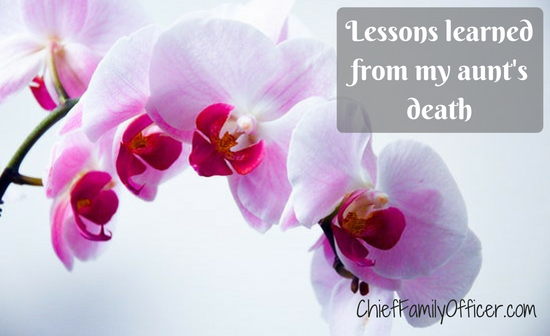Her death was the first close death in the family that I’ve dealt with as an adult. I know that makes me extremely lucky, and I’ve learned a lot in the last ten months that I want to share as food for thought. I'm not handling her estate, but our family is fairly close, so I've stayed informed about what's been going on in that regard.

- We are more loved than we realize. My aunt had been sick, so she'd sort of planned for her death and left behind a will and instructions. She wanted no fanfare - no funeral, no memorial, just a quiet departure. But she had so many friends and relatives who wanted a chance to remember her and say goodbye that we ended up having a small memorial service.
- Memorials and funerals are for those you leave behind. My aunt may not have wanted a service but those who loved her needed one. Especially her mother, my grandmother, who taught me that no matter how old you are, it never feels right to outlive your children.
- Unorganized estates cause massive headaches. My aunt had done the bare minimum in planning for her death, because we really weren't expecting it. However, your loved ones will be forever grateful if you leave behind a list of your accounts, and access information like usernames and passwords. Not to mention organized paperwork and/or digital files.
- Lawyers in private practice need to make sure client files and accounting are organized and up to date. Especially the client trust account. If that money can’t be easily accounted for, it’s a huge headache and requires state bar involvement.
- Declutter! As Gretchen Rubin says, outer order contributes to inner calm. So it's good to get rid of excess stuff for your own benefit. But also, keep in mind that someone has to go through all of your stuff and figure out what to do with all of it. You can gift family heirlooms while you’re alive (such as at milestone celebrations). Getting rid of anything you don't need or want is not only good for you, but so helpful to those going through your things.
- The more you plan, the easier it will be for the loved ones you leave behind. I vaguely recall that my grandfather had arranged for and pre-paid his funeral service and that my grandmother and her children greatly appreciated it. (This was over 20 years ago.) We've learned from my aunt's death, so we've been busy on that side of the family making sure everyone's wills are in order. But I don't know that we'll be able to get the pack-rats to declutter. For my part, I've been creating a master document with the necessary information in the event of my and/or my husband's death. If you don't have wills or "in case of" plans, please make them. Hopefully they won't be needed, but your loved ones will be so grateful if they are.




2 comments:
This is a great reminder! After cleaning out my mother's home, I got a new perspective on clutter, it's morbid but I think before I buy or keep a momento "Is this something my kids will just throw away when I'm dead?"
I acquired so many 'heirlooms' from her and have learned that I'm not a knick knack person. So they sit in boxes in the attic.
And I agree funerals are for the family you leave behind! May you find peace in the grieving process.
Thank you! I'm sorry about your mother. I know you're a Gretchen Rubin fan too, so I think you'll get it when I say that I'm now thinking this would be a good "know yourself better question" - are you a knick knack person?
Post a Comment